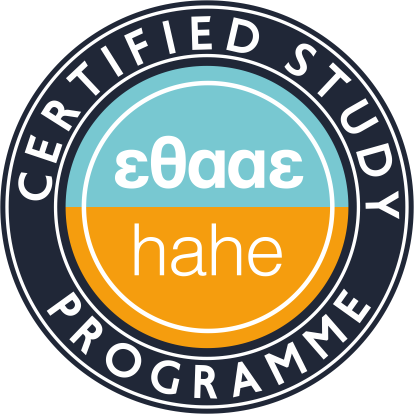2nd Semester - Semester: Language play and creativity in children
1. COURSE CODE S4-E
SEMESTER OF STUDIES SECOND
COURSE TITLE PLAY AND CREATIVITY IN CHILDREN'S LANGUAGE
SELF-ENDED TEACHING ACTIVITIES
in case the credits are awarded in separate parts of the course e.g. Lectures, Laboratory Exercises, etc. If the credits are awarded uniformly for the entire course, enter the weekly teaching hours and total credits
WEEKLY
TEACHING HOURS 3
CREDIT UNITS 6
COURSE TYPE SEMINAR
PREREQUISITE COURSES:
TEACHING AND EXAMINATION LANGUAGE: GREEK
THE COURSE IS OFFERED TO ERASMUS STUDENTS
COURSE WEBSITE (URL)
https://eclass.uth.gr/courses/ECE_P_110/
2. LEARNING OUTCOMES
Learning results
Upon successful completion of the course, the student will be able to:
identifies the categories of linguistic deviations-inventions in children's speech
interpret and evaluate children's linguistic inventions-constructions
relates children's linguistic creativity to the nature of language and cognitive-linguistic mechanisms
collect, analyze and interpret relevant data from authentic child speech
utilizes language creativity as part of language education for toddlers
General Skills
Search, analysis and synthesis of data and information, using the necessary technologies
Planning and managing work plans
Exercise criticism and self-criticism
Promotion of free, creative and inductive thinking
Adaptation to new situations
Autonomous work
3. COURSE CONTENT
The child as the creator of his language: the course of language development, characteristics and stages, through verbal inventions and deviations from the adult norm
Categories/types of linguistic inventions (derivatives & compounds, paretymologies, metaphors, phraseology, special categories of verbs with inconsistencies in syntax and voice, gender, etc.)
Mental and linguistic processes & mechanisms behind linguistic creativity
Collection of material and methodology in the study of linguistic creativity – databases, quantitative and qualitative analyses, etc.
Play and language development
Accompanying activities and exercises (indicative examples):
Describing children's language fabrications from authentic child speech: determining language level and type of deviation
Interpreting child language deviations: identifying linguistic and cognitive mechanisms
Annotating and editing audio-visual material and videos
Language creativity as a game: using neologisms and inventions in language teaching (making language games and texts) and ppt / poster presentation
4. TEACHING AND LEARNING METHODS - ASSESSMENT
delivery method
Live lectures with delivery of compulsory activities
workshop with presentation of teaching plans
USE OF INFORMATION AND COMMUNICATION TECHNOLOGIES
Communication with students via email,
use of MS Word & Internet for the implementation of the activities,
use Power Point to create lesson plan presentations for the workshop
Use e-class to post the material
TEACHING ORGANIZATION
Seminar
Semester Workload
Lectures (presentation of study material) 25
Independent learning 25
Elaboration and public presentation of teaching plans for the use of linguistic creativity in the education of infants 50
Post-lecture reflection activities 50
Total Course (25 workload hours per credit unit) 150
STUDENT EVALUATION
Evaluation language: Greek
Evaluation method: inferential
Suggested Bibliography:
Clark, E. V. (1993). The lexicon in acquisition. Cambridge: Cambridge University Press.
Clark, E. V. (2005) Creativity in language. In K. Brown (gen. ed.), Encyclopedia of Language and Linguistics (2nd edn): article 4741, 270-273. London: Elsevier.
Clark, E. V. (2005) Creativity in language. In K. Brown (gen. ed.), Encyclopedia of Language and Linguistics (2nd edn): article 4741, 270-273. London: Elsevier.
Motsiou, E. (2012). Lexical innovations (neologisms) in children’s speech: evidence from Greek. Contrastive Linguistics 2: 22-31.
Plonsky, L. & Gurzynski-Weiss, L. (2014). Research Methods. In Cristiane Fäcke (ed.), Manual of Language Acquisition, 31-49. Berlin: de Gruyter Mouton.
Plonsky, L. & Gurzynski-Weiss, L. (2014). Research Methods. In Cristiane Fäcke (ed.), Manual of Language Acquisition, 31-49. Berlin: de Gruyter Mouton.
Δήμητρα Κατή (2001). Απόκτηση της γλώσσας. Στο Α.Φ. Χριστίδης, (επιμ.), Εγκυκλοπαιδικός Οδηγός για τη Γλώσσα, 27-30. Θεσσαλονίκη: ΚΕΓ.
Ιωσηφίδης, Θ. (2008). Ποιοτικές Μέθοδοι Έρευνας στις Κοινωνικές Επιστήμες. Αθήνα: Κριτική.
Μότσιου, Ε. (2013). Κατασκευή δραστηριότητας ανάπτυξης παιδικού λόγου (σημειώσεις). Πανεπιστήμιο Θεσσαλίας.
Μότσιου, Ε. (2014). Γλωσσική ανάπτυξη και κατευθύνσεις για τη διδακτική πράξη. Ψηφιακή παρουσίαση για την πλατφόρμα «Ταξίδι στο Γραμματισμό». [Διαθέσιμη κατόπιν εγγραφής στο http://www.literacy.gr]
Μότσιου, Ε. (2015) Παρετυμολογία και παιδική γλώσσα. Παιδαγωγική Επιθεώρηση 60, 110-119. https://ojs.lib.uom.gr/index.php/paidagogiki/article/view/8610
Μότσιου, Ε. (2015). Εισαγωγή στη μελέτη της ανθρώπινης γλώσσας, κεφ. 6: 56-74. Βόλος: Πανεπιστημιακές Εκδόσεις Θεσσαλίας.
Μότσιου, Ε. (2016) Παραγωγή φρασεολογισμών από ελληνόφωνα παιδιά (5-7 ετών): στοιχεία από τον αυθόρμητο παιδικό λόγο. ΟΜΕΡ, Ερευνώντας τον κόσμο του παιδιού 14, 38-47.
Μότσιου, Ε. (2017). Aποκλίσεις («λάθη») στον παιδικό λόγο: βασικές κατηγορίες ανά γλωσσικό επίπεδο με παραδείγματα. Πανεπιστήμιο Θεσσαλίας.
Μότσιου, Ε. (2017). Νεολογικές κατασκευές στον αυθόρμητο λόγο ρωσόφωνων και ελληνόφωνων παιδιών: μια πρώτη προσέγγιση. Γλωσσολογία 25, 19-31.
Μότσιου, Ε. (2023). Εισαγωγή στην ανάπτυξη της γλώσσας, σσ. 119-125. Θεσσαλονίκη: University Studio Press.
Μότσιου, Ε. (υπό δημοσ.). Ψυχογλωσσολογικές όψεις των γλωσσικών κατασκευών στο λόγο ελληνόφωνων και ρωσόφωνων παιδιών. Πρακτικά του Διεθνούς Επιστημονικού Συνδρίου Ελληνορωσικές σχέσεις κατά την νεότερη και σύγχρονη περίοδο (18ος – 20ος αι.). Εθνικό και Καποδιστριακό Πανεπιστήμιο Αθηνών.
Παυλίδου, Θ.-Σ. (2008 ). Επίπεδα γλωσσικής ανάλυσης. Θεσσαλονίκη: ΙΝΣ.
Χατζησαββίδης, Σ. (2012). Νεοελληνική Γραμματική. Θεωρητικές βάσεις και περιγραφή. Θεσσαλονίκη: Βάνιας.
